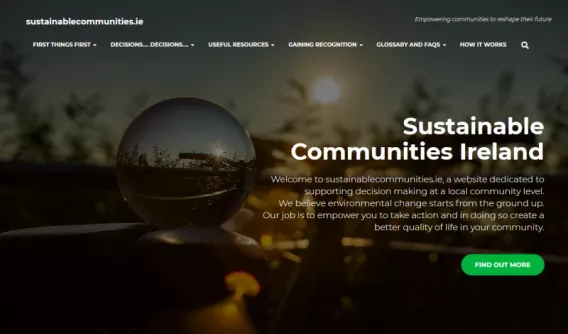Project
The project provides communities with the information they need to begin or speed up the process of making themselves more sustainable, and more resilient to change. The project provides comparative analysis from a variety of EU community projects, together with specialist technical financial and legal information, to support Irish communities to organize themselves to become more sustainable, and to enhance prosperity by keeping locally generated cash flowing within the local economy. The project: identifies potential new policies and actions; explains relevant laws and regulations; identifies income sources; and provides all information in non-technical accessible formats. Community activists are supported via an online Decision Support Tool and manual designed to incentivise and facilitate communities.
EU research shows that community actions can help meet national and international environmental targets (eg in greenhouse gas emissions or waste management). Most Irish communities have yet to develop the capability to exploit opportunities to reduce their environmental impacts and reduce expenditure which goes outside the community. Although the 2015 Irish Planning Policy Statement and the Energy White Paper emphasize community action, there are barriers to effective community action. In addition to Governmental policies, legislation and guidance to Local Authorities, we need 'bottom up' supports to facilitate and incentivize communities to begin to take appropriate actions.
Communities are actively involved with the University of Limerick throughout this project. The research team have been working with communities (for example Cloughjordan, Ballinagran, Freshford, Adamstown) in upwards of 10 previous funded projects, and we have established close ties with those which have persisted with their plans for greater sustainability. In this project we need them to tell us what they have found to be either encouraging or discouraging when they have attempted to organise themselves to be more sustainable. We need them to advise us on the first iteration online Decision Support Tool and the manual, to help us to ensure that the information we provide is clear, up to date and comprehensive, and we will need them to advise us on the overall usefulness of the final project outputs.
This project commences in October 2016 and will run for 2 years. The sustainability research team led by Bernadette at the University of Limerick has extensive experience, over 150 academic publications and 27 policy reports in the area of sustainability.
Research
There is a very extensive literature on defining sustainability, and many and complex analyses are available in the growing number of dedicated journals. Climate scientists have convinced Governments that we need to change the way in which we organise our lives. Material flow analyses similarly point up present and future problems, from the almost impossibility of finding new landfill sites, to the mid-term shortage of agricultural phosphorus. Much less well developed is the literature explaining how we can move society and economy from what we have now, to what we need to be doing by 2020, 2030 and beyond. This project is designed to provide one fully analysed and evaluated blueprint for incentivising communities to actively engage in the process of transformation. It is expected that this project will lead onto further EU Horizon 2020 research.
There exists a disjuncture between what in Ireland we have identified as necessary, and what in practice is being achieved. We urgently need to remove this disjuncture and start taking actions now considered part of everyday life in for example Switzerland, Germany and Sweden.
Evaluation of the ongoing success of the project is undertaken by a Steering Committee, and through six-monthly detailed technical and financial reports for the Environmental Protection Agency. The final reports to the Agency are evaluated through international peer review and review internal to the Agency, and if accepted then published online at epa.ie. Of equal importance, the project process and deliverables will be assessed by the communities which are the intended target for the work, and Government departments and other agencies which may elect to change laws, regulations and organisation to facilitate meeting the project goals.
Resources
